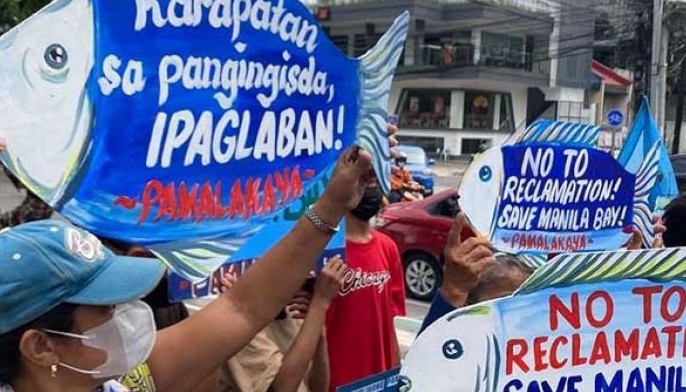MANILA, Philippines — An alliance of fisherfolk called on Environment Secretary Toni Yulo-Loyzaga to take a stand against reclamation projects in Manila Bay, which threaten the bay's marine biodiversity and the livelihood of coastal communities.
Members of Pambansang Lakas ng Kilusang Mamamalakaya ng Pilipinas (PAMALAKAYA) held a protest at the Department of Environment and Natural Resources on Friday urging Yulo-Loyzaga to issue a public statement denouncing reclamation, and ensuring that no environment permits would be issued to dump-and-fill projects.
Related Stories
“Given the environmental cost of reclamation, it should be a no-brainer for the DENR to oppose this activity if they are true to their mandate of environmental protection,” said PAMALAKAYA national chairperson Fernando Hicap.
PAMALAKAYA has recorded around 50 reclamation projects across Manila Bay that will cover over 30,000 hectares of its fishing waters.
The group said that two projects—the 420-hectare reclamation project in Bacoor City, Cavite and the 2,500-hectare airport project in Bulacan province—have resulted in the landfilling of fishponds, and the destruction of mangrove forests. The DENR issued Environmental Compliance Certificates for the two projects.
“Rejecting reclamation projects should be among the DENR’s disaster risk reduction and climate change adaptation measures. Scientists and environmental experts have long proven that there is no science in the world that tells us that reclamation is good for the marine environment,” Hicap said.
According to environmental groups such as Oceana Philippines, reclamation projects will decrease fish populations due to the loss of breeding grounds and disturb fragile ecosystems such as wetlands and mangrove forests.
It added that large-scale dump-and-fill projects may result in flooding, land subsidence and liquefaction, and may increase the vulnerability of people to disasters.
“On top of its environmental catastrophe, reclamation entails massive displacement of fisherfolk and coastal communities, threatening their livelihood and local fish supply,” Hicap said.
Yulo-Loyzaga, a climate and disaster resilience expert, earlier stressed the need for science-based governance, and for consultation and collaboration with stakeholders.


